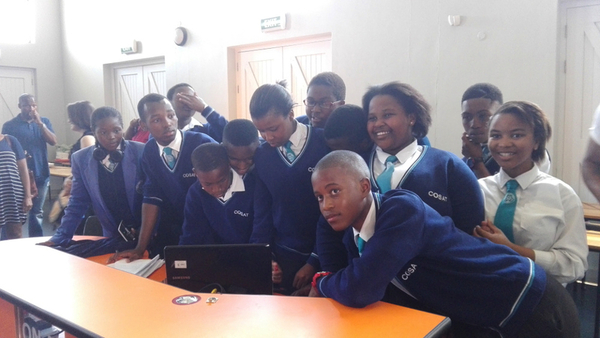

Optimistic Youth Reporters and their guests present a radio show at COSAT school in Khayelitsha. Photo by Pasqua Heard.
27 October 2015
Learners from the Centre for Science and Technology (COSAT), Khayelitsha, aired their first high school radio show last week. And they’re not shying away from difficult topics. The group, known as the Optimistic Youth Reporters (OYR), debated teenage pregnancy in a twenty minute live broadcast for staff and their fellow students in the school hall.
Last Monday the presenters discussed whether teenage fathers should face the same consequences as teenage mothers and the role that each should play in raising the child. They invited guests — learners from COSAT — to share their thoughts. Some responded in English while others spoke isiXhosa. Music played in-between the dialogue.
“It’s expensive to raise a child, so the mother and the father must work together,” said a girl guest.
A boy guest said, “The mother and the father play very different roles. The mother carries the baby for nine months, so she must stay at home in that time to make sure that the baby is healthy. The father must be supportive and continue education. Once the baby is born, the mother can go back to school.”
“Teenage fathers took part in making the baby, so they should also take responsibility for the baby,” said another girl.
One of the presenters asked what teenage mothers can do if they do not want to depend on teenage fathers.
”We want to pull away from the stigma that Khayelitsha is corrupt and dangerous, and rather give it a positive stance.”
A girl guest responded: “They can go to NGOs that have clinics that will help support them, because sometimes their families aren’t supportive of teenage mothers. There are also South African children’s grants. Also, if they want the father to pay maintenance they can go to family courts.”
A few students said that teenagers should avoid practising unsafe sex which could lead to sexually transmitted diseases and pregnancy.
Khanyisile Ngcolo, one of the show’s reporters, said, “I was trying to give the view from the women’s perspective. The dad, including stepfathers, must also play a role in raising the child. We want to cover topics about issues that affect the community, like gangsterism. But we also want to pull away from the stigma that Khayelitsha is corrupt and dangerous, and rather give it a positive stance.”
“I think the radio station provides a good image for COSAT. The learners like the station and the idea of being informed,” said Thokozani Nqwili, another reporter.
Elethu Rotsho, who had to operate DJ equipment for the show, said, “I panicked and couldn’t reach some of the buttons. Next time I’ll be more experienced.”
Roshto explained that the OYR gained their research from the internet and through interviews conducted with learners both at COSAT and other schools.
Experienced radio journalist Linda Daniels of the Children’s Radio Foundation (CRF) has been working with OYR since 2013. CRF together with OYR have been producing regular radio features for SAFM. For this, OYR received The Best Debaters Award at the National Youth Radio Awards. (The school radio show was the first one OYR did alone.)
Daniels says that accurate and ethical reporting is one of the things that the students have been taught. Daniels was thrilled with their first performance, particularly that they dealt with “hiccups that presented themselves in the show with such flair that the crowd didn’t notice.”
With upcoming exams, the next show will only be aired in the new year. “We would love for the show to air frequently and we hope to get a transmitter in the future,” said Daniels.